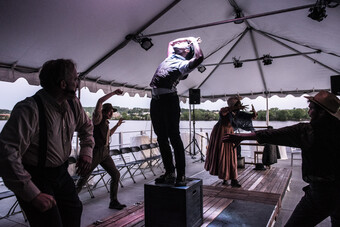The Hybrid Artist Sells as Well as Saves
On a moist Miami weekend in June, I attended CityWrights, a conference spearheaded by City Theatre. P. Carl, editor of HowlRound, gave the keynote. Long after the weekend was over, his words kept swimming around my head, like an untiring minnow whispering ideas with every fin stroke. What I heard, as the burning core of Carl’s talk, was the question: how do we make a life in the theatre in the twenty-first century? How do we continue to write, direct, and produce plays that remain true to the power of catharsis while still managing to pay our bills? Carl talked about how Art had saved him, giving him an abundance of hope and purpose. And then he asked: "If Art creates abundance, why are we all living in scarcity?"
The myth of the starving artist is, unfortunately, alive and well in some sectors of the arts—particularly in the theatre. I can also say that Art saved me, but as in all complicated endeavors, I can also say the opposite. I can say that Art tried, many times over, to murder me in my sleep. My desire to live my life as an artist forced me into ghettos where I dodged bullets and into days in which the only lunch I could afford was a stolen handful of nuts from a Whole Foods bin. This is not romantic. It's stupid. I eventually decided: no more. And I'm not the only one. Artists everywhere have surfaced and said no more. No more mythic Icarus ramming himself into the sun and melting into the ocean. There's a way in which that same Icarus can fly, spanned wings across the sky, safe, and yet still beautiful, even awe-inspiring. What I want to argue here, is that the theatre and the performing arts are lagging behind other arts—we're standing in the wings, while the action is taking place on other people's stages.

Photo by Vanessa Garcia.
My desire to live my life as an artist forced me into ghettos where I dodged bullets and into days in which the only lunch I could afford was a stolen handful of nuts from a Whole Foods bin. This is not romantic. It's stupid.
Television writers, novelists, Young Adult writers, illustrators—all of these artists have found a way to embrace millennial capitalism (for lack of a better term; call it "late capitalism" if you like)—and the theatre has been late to catch up. Let’s look, for example, at how theatre has fared in comparison to television. Television, like theatre, requires the work of writer, director, producer, actor, and so on—all in collaboration. The difference is that TV writers aren't starving. And, in fact, TV writers have created a new movement in programming, led by the likes of The Sopranos and followed by shows like Mad Men, that produce quality TV, TV that is full of the kind of smart art that has the potential to “save” us. TV that is both "Art," capital A, and commercially successful.
How did TV do this, particularly networks like HBO, Showtime, and, in the case of Mad Men, AMC? The answer lies in the Showrunner. The Showrunner—people like David Chase of The Sopranos and Matthew Weiner of Mad Men—creates, writes, and produces, manages and markets. The Showrunner is more than just a writer. "The result is a paradigmatically neoliberal vision of the writer and his labor," writes Michael Szalay in his article “The Writer as Producer; or, The Hip Figure after HBO,” published by Duke University Press this year.
P. Carl, in his keynote, worries that too often "money trumps soul” in our profession. He cites an experience in which money ruined a production he deeply believed in, causing him to flee from the project, due to overzealous money-focused producers and agents that devalued the art in favor of the potential income. This does not seem to happen, however, in the TV shows I'm talking about because the producer is the writer—the creative and monetary forces are one—money, in this case, does not always trump soul. So, why not apply this model to the theatre?
What the Showrunner model calls for is the need for a writer to be more—more things to more people. This is a new kind of artist, one very much aware of what it is he/she wants to write, one that wants to keep creative control, while also being aware of what it means to put that vision out in the world—in other words, what it means to "sell" that vision. This is a vision acutely in line with the contemporary generation of neo-hipsters and millennials. "Today's ideal social form is not the commune or the movement or even the individual creator as such; it's the small business. Every artistic or moral aspiration—music, food, good works, what have you—is expressed in those terms. . . call it Generation Sell," wrote William Deresiewicz in an article for The New York Times in November of last year. "Our culture hero is not the artist or reformer, not the saint or scientist," continues Deresiewicz, "but the entrepreneur. (Think of Steve Jobs, our new deity).
Autonomy, adventure, imagination; entrepreneurship comprehends all this and more for us. The characteristic art form of our age may be the business plan." To sell does not mean to sell-out. At least not the way it used to. The playwright can either play-in or lose out. The novelist has already adhered. "These guys [contemporary novelists] are acutely aware of the multiple audiences for which they write," says Szalay, whose upcoming new book is entitled The Novel after HBO. He continues: "For a generation of novelists that began to achieve fame and distinction in the early twenty-first century—like Michael Chabon, Jennifer Egan, Jonathan Lethem, Colson Whitehead, Junot Diaz, and Dana Spiotta—the term ‘sell-out’ just doesn't apply." For performing artists to be able to adhere, our attitude towards money has to change.
To sell does not mean to sell-out.
In a recent article "A Dancer's Retort" in The Huffington Post, Brittany Beyer, dancer and associate editor of The Dance Enthusiast, also calls for a new form of operation in the performing arts. She writes:
One important issue is the dance artist’s attitude towards money. Many of us have been brought up with the idea that our field is beyond a job— to be an artist is almost a sacred calling. If you have ever danced you will understand. We love our art form and have the conviction that it does others good. With integrity and passion we put our bodies—our very selves—on the line to create. Our work is beyond a job description; in many ways it is a life's practice or a life's mission. How does one monetize that?
Healers are "sacred" too, aren't they? Doctors, for instance. And we pay them, don't we? We pay them a bundle. There is a whole other discussion here about health care in this country and about what we do and do not value socially and who gets access. The point, for now, is—why should artists be poor? Other life missions and practices are paid for. If we pay people to heal our bodies, why shouldn't we pay them to heal our souls? Perhaps this seems trite, cheesy, or too sincere. But, I think it's true. And, truthfully, I don't care about it sounding "too sincere." Irony is no longer king.
For my theatre company's next show—a devised piece of theatre called The Underground—I plan to have the audience pay once the performance is over. "Pay what you feel it's worth," I'll tell them. In other words, I'm going to ask them to monetize their feelings right after they've felt the full impact of the experience, rather than before. This tactic says to the audience: if you feel like this piece moved you and you want to see more, then place more money in the bin. If you ask me later, I'll let you know how this goes. I think it's worth a try. I also think it's a way, theoretically, to stay true to the art form, while allowing for certain people to pay what they can—anyone will be allowed in, and the audience itself will decide, on an individual basis what it can and wants to pay—while at the same time, forcing audience members to place a value on what they are seeing. This is a way of both contributing to the Commons—making the art accessible to everyone and adhering to ideas of value inherent in late-capitalism, so that Art and those that make it can survive and thrive, and make more Art.
The difference between this model and the prepaid ticket model in most theatres is that I, wearing various caps (writer and producer included), will distribute the money equally among the members of the troupe. Actor, producer, writer, set, and lighting designer will all be working together, their skills will merge, as this is "devised" theatre, and all will be paid equally. We cannot live without money. We cannot produce art without money. It seems to me impossible not to monetize the result of an artistic process. And, it seems sillier still to pretend like art and money have nothing to do with each other. As soon as artists realize this, the better off we will be. This mindset becomes dangerous when producers, not creatives, are the one monetizing—particularly producers who are more interested in the money than the art (not all are like this, I should add).
The clearest solution, again, seems to be for the artist/playwright to be tied to the production—to become a "Showrunner." This requires the artist to become a hybrid. Going back to the Icarus myth—allow the sun to give us energy, rather than drown us. This doesn't mean we must always produce our own work. We can allow traditional models to merge with newer models; this too can be hybrid in nature. Technology now gives us all access to the means of production. The writer can now learn Photoshop. The creative can now market on Facebook and Twitter (and it works). The audience is used to receiving information from multiple sources.
Devised Theatre trends prove that audiences are open to theatre reflecting the world they live in—after all Devised Theatre is a form of hybridity, a place where all the artists are Showrunners in the sense that they take on many roles. Now it is time to apply this idea to the way we make money in the theatre. It is our job, as theatre professionals, not to fall behind—not to kill art or allow it to kill us. It is, in fact, our job to keep it alive, to keep it thriving in a world full of hybrids. It is our job to save people's lives, and to do this, we need to fully understand what it means to be alive, making and receiving art in twenty-first century America.









Comments
The article is just the start of the conversation—we want to know what you think about this subject, too! HowlRound is a space for knowledge-sharing, and we welcome spirited, thoughtful, and on-topic dialogue. Find our full comments policy here
Vanessa, great article. It was hugely refreshing to stumble upon this. Nice to find someone on the same page. I use different wording for many similar ideas. I am Artistic Director of a small outfit putting many of these ideas into practice. I recently wrote a blog post about it actually, at http://www.bradmcentire.com...
Well said despite caveats about the tons of money washing onto the shores of showrunners. This raises again for me the question of whether the business model used by nearly all of our regional theatres shares major responsibility for the difficulties playwrights face both in gaining productions and making a reasonable living. The nutshell version of this idea: 1) Playwrights are among the few artists involved in rep company production that are hardly ever hired as anything other than independent contractors, so playwriting is simply reduced to "work for hire" and playwrights are thus hardly ever a significant voice -- or even a voice at all -- in the management and leadership of our regional theatres; 2) The subscription ticket dependence of our regional theatres in addition to being increasingly unhealthy financially, forces an emphasis on New York stamped plays and makes the programming of most new scripts in full productions a huge risk since today's theatre audiences, like audiences before them, respond most to subscription brochures that hustle plays that have gained prior stamps of approval. That hybrid of playwright/producer who then becomes an artistic director of a rep company may be a real hope for the future.
Well said.
Good article and an encouraging model for writers. I encourage you to set a dollar figure for success for this experiment. How much do you want to make and since you're splitting the net with your team, how much do they want to make? See if the results measure up. I remember that Steven King experimented with giving away a new novel online and asking readers to pay what felt it was worth. He only did that once! I suspect you'll have the same result but it's good to try - it's how we learn. Mazel tov.
I am a writer recently turned producer and just opened my first season in a small theatre in Boston to two full houses. Three college productions are now underway because of people who saw the show. Thank you for this huge shot in the arm, expressed so eloquently.
In TV, there are hundreds of thousands of dollars in advertising money-- and, in the cases of AMC and HBO, cable subscriber money-- that have no analogue in theatre. How can simply turning writers into producers imitate the success of showrunners, when a theatrical showrunner would still suffer from the lack of funds that force the current model of writers and producers to live under the starving artist heading?